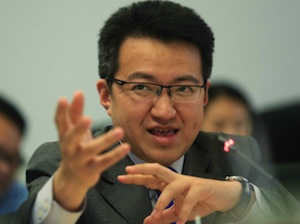Umno to fall like dominoes? Not so simple, BN men tell DAP strategist
(Malay Mail Online) – Barisan Nasional (BN) lawmakers have dismissed DAP election strategist Liew Chin Tong’s assessment of the opposition’s winning potential in the 14th general election as wishful thinking, arguing that he failed to consider the constant change in Malaysia’s political landscape.
The elected representatives from Umno, the country’s dominant political party, scoffed at Liew’s “Peninsula Dominoes” theory as a simplistic analysis that also ignore the issues facing the opposition themselves.
“This is the problem with the DAP young turks like Chin Tong. They are becoming overconfident with their abilities as they have only seen the positive momentum since starting their political careers prior to 2008 elections,” Pulai MP Datuk Nur Jazlan Mohamed told Malay Mail Online via text message this week.
“People may be fed up of BN but they also know the reality of supporting an opposition which is incompatible in principles and prone to breakdown every few years.
“They may not necessarily gamble their future on a change of government that will not change things positively,” he added.
In his GE14 analysis, Liew proposed that the opposition avoid contesting 30 BN strongholds and instead focus its resources on 38 marginal seats to make Umno fall like dominoes.
Liew stressed that this is the best strategy for “the new Opposition” to form a stable government with a strong legitimacy as “elections are won or lost in marginal seats”.
The Johor DAP chief added that BN is bound to face a “Malay economic tsunami” caused by a string of controversies tied to debt-laden 1Malaysia Development Bhd (1MDB), which he estimated would cause a 6-per cent swing in support that would be sufficient to put the opposition in power.
Kota Belud MP Datuk Abdul Rahman Dahlan, however, played down the effect the alleged fiscal mismanagement by Putrajaya will have on voter sentiments, claiming that it is but one of “many other considerations” that run through their minds before casting their ballots.
He asserted that questions persist over the opposition’s ability to “respect certain provisions” in the Federal Constitution, and also their failure to deliver on promises despite being in charge of three state governments, such as the ongoing water woes in Selangor and housing and development issues in Penang.
“And now that PAS is no longer with DAP, I don’t think Liew should be that confident. He should go back and redraw his numbers, because things have changed a bit,” Abdul Rahman said.
Nur Jazlan noted that Liew’s analysis would work if DAP and PAS had maintained cooperation and if Datuk Seri Anwar Ibrahim were still a viable candidate to be prime minister, but the fact that the two parties have parted ways will only work in BN’s favour, especially in three-cornered fights.
Nur Jazlan, however, admitted that DAP could capitalise on BN’s “inability to handle change”, especially the rapid pace of urbanisation and changes in voter demographics.
Despite BN’s shortcomings, Abdul Rahman stressed that the power of incumbency is a significant factor that favours the ruling coalition.
“It is not business as usual. We’d be doomed if we think so. But the more that we are aware of the problems, and if we are willing to take the difficult steps… if we can agree to say, 60 per cent of what the people want, then we are home free,” he said.
In Election 2013, BN failed to regain its coveted two-thirds majority as it won only 133 of the 222 federal seats, while Pakatan Rakyat took 89 seats. A win of 112 seats is needed for a simple majority.
Liew is the mastermind behind a Pakatan Rakyat gamble in Umno stronghold state Johor in Election 2013 that successfully ousted several BN stalwarts, with a haul of five out of 26 federal seats there.
BN is embroiled in controversy over claims Prime Minister Datuk Seri Najib Razak received US$700 million (RM2.6 billion) from 1MDB.
Umno is also facing a crisis due to Tun Dr Mahathir Mohamad’s bid to remove Najib as prime minister over 1MDB and other scandals.
But the federal opposition also has its own troubles after Pakatan Rakyat was declared dead recently while leader Datuk Seri Anwar Ibrahim was sentenced to five years’ jail.
DAP has in the past few years sought to overcome its image as a Chinese-centric party with the influx of new Malay members such as national laureate Datuk A. Samad Said.
DAP ally PAS has yet to come out with a final decision on splitting with it, while PAS progressives have set up a new movement that could well be part of the new opposition line-up.


